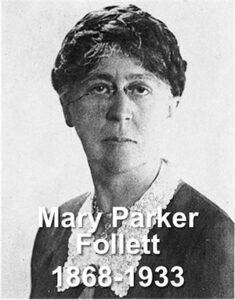Mary Parker Follett: Management Thought Leader of the Early 1900s
 Mary Parker Follett was born in 1868 in Massachusetts and was a management consultant, social worker, philosopher and pioneer in the fields of organizational theory and organizational behavior. Along with Lillian Gilbreth, she was one of the two outstanding women management experts in the early days of classical management theory. She was one of the first theorists to actively write about and explore the role people had on effective management. Her work has had an enduring residence in management theory and is arguably considered central to contemporary and modern-day management and organizational theory. Her work was not given the recognition it deserved at the time arguably because the world was not ready to hear her concepts.
Mary Parker Follett was born in 1868 in Massachusetts and was a management consultant, social worker, philosopher and pioneer in the fields of organizational theory and organizational behavior. Along with Lillian Gilbreth, she was one of the two outstanding women management experts in the early days of classical management theory. She was one of the first theorists to actively write about and explore the role people had on effective management. Her work has had an enduring residence in management theory and is arguably considered central to contemporary and modern-day management and organizational theory. Her work was not given the recognition it deserved at the time arguably because the world was not ready to hear her concepts.
Mary Parker Follett defines management as ‘the art of getting things done through people.’ The philosophy she posits is based on the idea of shared power structures inside organizations. She advocates flatter organizational structures, informal networks and lateral processes. She recognizes the holistic nature of community and advances the idea of ‘reciprocal relationships’ in understanding the dynamic aspects of the individual in relationship to others. Follett advocates the principle of what she terms as ‘integration’, or non-coercive power-sharing, based on the use of her concept of ‘power with’ rather than ‘power over’. She saw power as an expandable force rather than a limited one.
Although most of Follett’s writings remained contained in very limited circles until republished at the end of the 90s, her ideas gained great influence after Chester Barnard, a Bell Executive and advisor to the then US President, Roosevelt, published his seminal treatment of executive management ‘The Functions of the Executive’. Barnard’s work stressed the critical role of softer factors such as communication in organizations and owed a debt to Follett’s thought leadership and writings.
Mary Parker Follett’s work set the stage for a generation of progressive and effective change in management philosophy, style, and practice, revolutionizing and humanizing the American workplace. Her work arguably allowed the fulfillment of Douglas McGregor’s management vision of determining quantum leaps in productivity through the humanization of the workplace.
Following her death, Mary Parker Follett’s work and ideas disappeared from American organizational and management circles of the time but continued to gain followership in Great Britain. In the last fifty years, her work has been rediscovered. During the 1960s, her ideas would re-emerge in Japan, where thinkers applied her theories to business.
Management theorist Warren Bennis said of Follett’s work, “Just about everything written today about leadership and organizations comes from Mary Parker Follett’s writings and lectures.” Her work outlines modern ideas under participatory management, decentralized decisions, integration of groups, collaboration and shared power/authority. What an amazing thought leader and outstanding management theorist!!!
The Contributor
 Ms. Louise Delaney is a Doctor of Applied Leadership & Coaching Candidate. She holds a Master’s Degree in Innovation & Technology Management from the Dublin Institute of Technology. She also holds a Bachelor’s Degree in Business Studies from the Dundalk Institute of Technology, Ireland where she also earned a Post-graduate Diploma in Management & Technology. In addition, Louise has a Diploma in Social Studies.
Ms. Louise Delaney is a Doctor of Applied Leadership & Coaching Candidate. She holds a Master’s Degree in Innovation & Technology Management from the Dublin Institute of Technology. She also holds a Bachelor’s Degree in Business Studies from the Dundalk Institute of Technology, Ireland where she also earned a Post-graduate Diploma in Management & Technology. In addition, Louise has a Diploma in Social Studies.
Professionally, she has held various leadership positions in the technology sector in Ireland, spanning a career of over 20 years and is highly specialised in growing, developing and leading high-performance teams. Louise is curious about all aspects of women’s leadership and is keenly interested in the emerging field of spiritual intelligence and its potential role in women’s leadership development.
